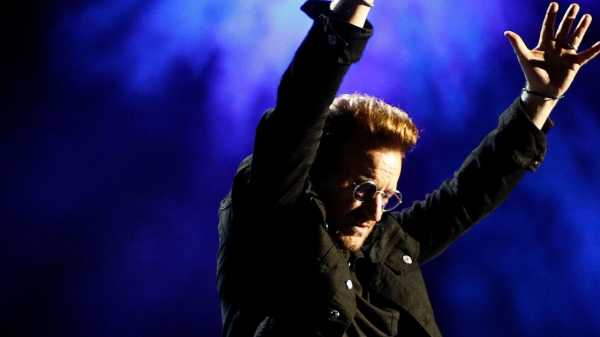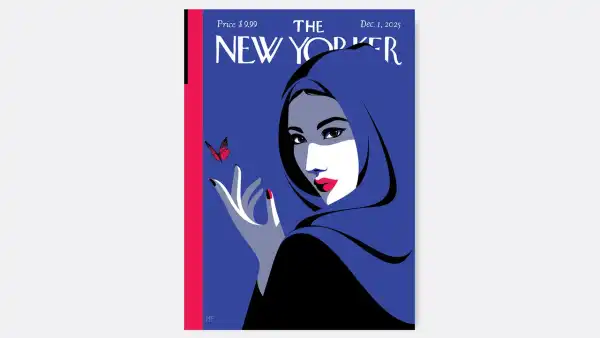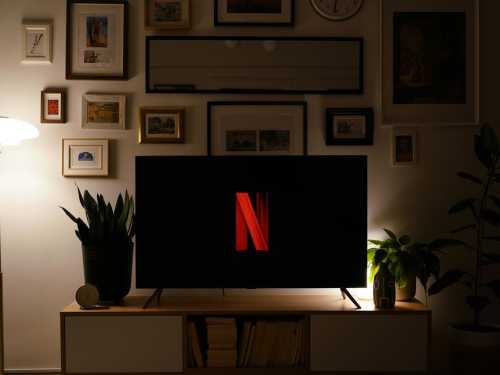
Love for a band, like love for a person, can move in mysterious ways.
Rarely, in my experience, do you love a band with your whole heart for a
decade and then turn away sharply, never to return, but that’s what
happened to me with U2. When I was in middle school, circa “War” (1983)
and “The Unforgettable Fire” (1984), I adored U2, as did every
thoughtful sixth and seventh grader at my school, inspired by the
sophisticated eighth and ninth graders with puffy young-Bono haircuts
and long wool coats with U2 buttons on the lapels. At dances, we danced
to “Sunday Bloody Sunday” and “Seconds” and “I Will Follow,” thinking
about the Troubles and nuclear war and devotion, feeling riled up,
worldly, and serious at once. U2 made the political sound physical; they
made pop feel essential, global, elevated. In the news and in social
studies, we learned about the I.R.A., apartheid, and the nuclear-arms
race; U2, with forthright urgency, seemed to be singing about all of it.
And they had ridiculous names like Bono and the Edge.
U2’s inspired early albums had the confidence to be stark. The Edge’s guitar, high and needling, sounded
like an alarm bell, Adam Clayton’s bass had propulsive gravitas, and
Larry Mullen, Jr.,’s drumming landed like artillery, while Bono’s
soulful singing pleaded strenuously against violence. Their antiwar song
“Seconds,” from 1983, sampled a recording of a military cadence—“I want
to be an airborne ranger / I want to live a life of danger”—to thrilling
effect. (Two years later, Bender sang the same
lines in “The Breakfast
Club,” with a similar spirit of ironic menace.) In those days, U2 often
invoked the drama of violence to heighten a message of eradicating it.
“Pride (In the Name of Love),” whose emotional climax is the Martin
Luther King, Jr., assassination, pairs “shot rings out in a Memphis sky”
with “free at last” and “they could not take your pride” in a way that
could break your young heart—and in a way that can make you cringe a bit
when you’re older. (Especially because Bono gets the time of day
wrong—an error he sometimes corrects in live performances.)
“The Joshua Tree” came out in 1987, and it felt new, an evolving form of
U2: there was a sense of fruition in that weird, spiky-treed desert. The
opening notes of “Where the Streets Have No Name” gave us the sound of
something like dawn, and then the Edge’s familiar rolling spikes; here,
on this album that pictured the four band members glowering in the
desert, that guitar seemed to evoke big skies and wide-open spaces. “The
Joshua Tree” was about America, in part; it sounded big and Western,
from the point of view of a thoughtful skeptic. They almost called the
album “The Two Americas,” after “the mythic America and the real
America,” Bono recently told NPR. He said that they were “obsessed by
America at the time,” and called it “a sort of promised land for Irish
people—and then, a sort of potentially broken promised land.” America is
an idea, he said, that belongs to everybody. “The Joshua Tree” felt
elemental. It was the only U2 album I listened to as a complete album,
over and over, loving the whole thing—the deep cuts more than the
singles. I fell especially hard for “Red Hill Mining Town” and its
soaring harmony in the line “love slowly stripped away.”*
I associate listening to “The Joshua Tree” with arts camp, in 1988, the
summer I was fifteen. I was wistful and romantic, as I’d always been. It
was a spectacular summer, but, for some reason, my chief association
with “The Joshua Tree” is of being alone in my dorm room, feeling
connected to “Red Hill Mining Town,” stewing about a roommate who
borrowed my pajama top, wore it as a shirt, went outside, and flirted
with a boy in it. Why does this album make me think of that girl, that
boy, that pajama top? I think it’s because “The Joshua Tree” felt
gratifying to a fifteen-year-old to whom adult experience, including
sex, was adjacent but theoretical. In the years that followed—high
school, driving, boys, rebellion, college—my perspective changed. In
1991, when U2 released “Achtung Baby,” I was a freshman in college, and
I didn’t like its dumb title and its iffy vibe. “Zoo Station” and other
album tracks sounded blank to me, distanced, meta, dull—especially
compared with revelations like the Pixies and Nirvana. The spark was
gone; I didn’t know U2 anymore. “Mysterious Ways” felt halfhearted, more
an idea than an urgency, and “One,” which I found genuinely beautiful
and moving, made me so sad that I didn’t want to listen to it. It felt
like my breakup song with U2. Bono put on those big dumb wraparound
glasses and went his way—toward Zoo TV and N.F.L.-fadeout blandness and
ironic but real megastardom—and I went mine.
But then, in June, I learned that U2 was touring “The Joshua Tree.” “The
Joshua Tree”! That was when U2 and I had been happiest together, and
after which we had become strangers. Perhaps by returning to it, we
could meet again as friends. The political climate now, in all its
extremity and polarity, strikes a chord with the political climate
then—it evokes those earlier nightmares, protests, and rebellions. The
fear and vulnerability of that era is back, and magnified. Maybe hearing
the music, I’d tap into my youthful energy, too—or even hope. The Edge
told Rolling Stone recently that the album’s thirtieth anniversary
took on new meaning after the Trump election. “Weirdly enough, things
have kind of come full circle,” he said. He continued:
That record was written in the mid-Eighties, during the Reagan-Thatcher era of British and U.S. politics. . . . Thatcher was in the throes of trying to put down the miners’ strike; there was all kinds of shenanigans going on in Central America. . . . It just felt like, “Wow, these songs have a new meaning and a new resonance today that they didn’t have three years ago, four years ago.”
On the Thursday before the July 4th weekend, as the New Jersey Transit train
pulled into Secaucus Junction, a guy stood up and wailed, “With or
without you!,” giddily. On the Meadowlands shuttle, I listened to “The
Joshua Tree” in my earbuds. “Bullet the Blue Sky” played as we chugged
through swamps and office parks; outside, it was America. At the
stadium, there were police dogs and state troopers in military-style
gear. A mass of people in business casual moved toward gates named after
corporate sponsors. As if in a DeLilloian dream world, I passed Verizon
Gate, SAP Gate, and Bud Light Gate, then found mine, Pepsi Gate,
towering red, white, and blue, like a castle made of Pepsi logos.
I sat way up high, above names of historic Jets players—Emerson Boozer,
Weeb Ewbank—in the realm of a P.O.W./M.I.A. flag, an American flag, and
Jumbotrons. It was practically the sky, but my ticket had cost well over
a hundred dollars. Down below, a Joshua tree-shaped stage with a long
trunk of runway jutted into the crowd. A sunburned Will Ferrell-like man
near me wore a vintage U2 hat and shirt. He sat with his quiet young son
but talked to everybody else. “What’s U2’s flagship song?” he said to a
stranger, pointing. “Careful!” He’d seen U2 in Denver and Pittsburgh, he
told a couple; owned vintage U2 T-shirts older than he was; at an M.S.G.
show, had once been seated near Michael Stipe. “Because they’re
friends,” he said. “Now I’m here with you guys! No offense. Where are
you from?”
None of this helped my mood. But then the lights in the stadium went
out, and Larry Mullen, Jr., at a drum kit in a far blob of the
tree-shaped stage, began playing the opening rat-a-tat of “Sunday Bloody
Sunday.” I felt instant joy—I was somehow fifteen again, grumpiness
gone, heart full of gratitude. Everyone flew to their feet. The Edge
strode down the tree-trunk stage, playing guitar; Bono followed him,
singing. “I can’t believe the news today,” he sang, and we sang, too. “I
can’t close my eyes and make it go away.” It was a moment of unity in a
tense and terrible year—if a strange one. “Broken bottles under
children’s feet,” we sang. “Bodies strewn across a dead-end street.”
As I’d suspected, U2 bookended “The Joshua Tree” with the spectacular
music that came before it and the music I don’t like that came after it.
They sounded great—fully present, alive to these songs after all this
time. Bono was like a benevolent host, making everyone at home, a little
comfortably grandiose. When he turned to my section, looking up and
spreading his arms wide, we went wild. After “New Year’s Day”—the old
urgent dreaminess of “I want to be with you / be with you night and
day,” and the sunburned dad yelling, “Best song ever! Best song
ever!”—Bono thanked us for coming out “on this hot summer’s night” to
see “your favorite Irish band.” He offered “a prayer, this evening, that
we have one of those epic nights,” and offered himself and the band to
be useful. “That’s our prayer, to serve,” he said.
U2 has always had Christian-themed lyrics, often based on scripture, and
Bono seems comfortable in the pop-preacher role he’s made for himself.
He asked the stadium to turn its lights off, and the stadium obeyed; he
asked us to look up to the sky, and we did. People held up lights on
their phones and the stadium seemed to fill with stars. It felt sacred
on a big scale, something that seemed to only be possible in an arena. I
suspected that this kind of moment, and the otherworldly togetherness
created by music, gives musicians the illusion that they can unite us in
other ways.
The “Joshua Tree” tour, on track to be the highest-selling tour of
2017, has so far sold 2.4 million tickets worldwide. In their
thirty-odd years of being solidly in the mainstream, U2 has been
playing for broad audiences that do not uniformly embrace the band’s
progressivism. Throughout the night, Bono made attempts at inspiration
and conversion. He contemporized some lyrics; in “Pride (In
the Name of Love),” he changed “one man washed up on an empty beach” to
“one boy,” evoking Syrian refugees. Between verses, he offered a kind of
sermon for unity, invoking Martin Luther King, Jr. He encouraged us to
hold on to “the joy, the compassion, the community.” He cried, “America,
that’s who you are!” Did he truly believe this? I wondered. I once
had—or had hoped to, when the Obamas had said such things. Coming from
Bono, in 2017, the rhetoric felt like wishful thinking, or naïveté.
It was time for “The Joshua Tree.” The lights turned white, and the Edge
played the rolling, pointed guitar of “Where the Streets Have No Name.”
During the seeking, beseeching “I Still Haven’t Found What I’m Looking
For,” the stadium began to feel more explicitly like a megachurch. I
began to worry that Bono thought that he was the Reverend Dr. Martin Luther
King, Jr., of pop. “Take us to church!” he shouted. “The church of Frank
Ocean! The church of Michael Stipe!” He clapped his hands over his head
and sang about breaking bones, loosening chains, carrying a cross.
During “With or Without You,” when he sang about a thorn in a side and a
bed of nails, I thought of a Bobcat Goldthwait
bit from the 1987 MTV Video Music Awards that had made me see Bono in a new
light. Goldthwait, agonizing in a leather vest, leapt around, singing,
“My hands are tied, my body bruised,” raising his arms and crossing his
wrists, solemn, messianic, ridiculous. This shocked and thrilled me.
Until that moment, I’d thought of Bono as nobly unmockable—but here he
was, being mocked, in a way that, despite my affection, felt exactly
right.
U2 played the album in order, and it sounded glorious. During “Bullet
the Blue Sky,” a man near me mimed the lyrics—slapping down those dollar
bills, turning a key and unlocking the door. Bono danced like a beatnik,
posing in pointy shapes. The Edge’s guitar playing sounded smoldering
and apocalyptic; red lights swept across the stadium. At fifteen, I
found this to be a very sexy song; I still do, even though I now realize
that it’s about U.S.-backed violence in El Salvador, and that the man
slapping down the dollar bills—“his face red like a rose on a thorn
bush”—is, according to Bono, Ronald Reagan. As my beloved “Red Hill
Mining Town” began—a song inspired by the 1984 U.K. miners’ strike, and
which they hadn’t played live until this tour—a muscular guy a few rows
down leapt to his feet and threw his fist into the air, with what looked
like real emotion.
Throughout the performance of this America-inspired,
social-justice-themed album, American anxiety persisted. Introducing “In
God’s Country,” Bono thanked those who keep us safe and those of us who
“keep us awake”—“like journalists, for example.” This did not go over
big. (One person in my section threw a fist in the air and yelled
“Whoo!”; that person was me.) He talked about how “this country has
given us Irish sanctuary,” showing the Irish flag onscreen, so “the
great amalgamé would feel at home.” At this, people started chanting
“U.S.A.! U.S.A.!,” in a tone that did not suggest sanctuary. During “Trip Through Your Wires,” as a video played of a woman in jeans and a
Stars-and-Stripes bikini top twirling a lasso, I felt a bit funereal,
America-wise.
“Where are we, the Edge?” Bono asked, halfway through Side Two. (The
Edge said that they were in New Jersey.) Bono said that they’d written
“One Tree Hill” for their friend who died young, and suggested that we
think of someone we’d lost. I’ve often resisted such instructions—as a
child at church, for example—but I immediately thought of someone and
gave myself over to it, imagining that this song was for him. It felt
good. “Oh, great ocean,” Bono sang. “Oh, great sea.” Bono, for all his
intentional charisma, can also be reasonable, and hard to resist. “Thank
you for giving us a great life,” he said. “Thank you for listening to
‘The Joshua Tree.’ ”
Though by this point I had reopened my heart to U2, I still couldn’t
enjoy their newer music, or pretend to understand exactly what they’re
doing. For the rest of the show, I watched others sing and sway and turn
pastel colors in the lights, to songs that sounded like a bland mush to
me, as video played, on inspiring, lightly political themes. This
messaging was more than some people could handle. There was more
chanting of “U.S.A.! U.S.A.!”; one man screamed, “God bless Donald
Trump!” and another yelled, “Yeah!” Bono quoted Emma Lazarus and played a
mollifying clip of Ronald Reagan—the “shining city on a hill” speech,
about how our doors would be open to anyone. “Thank you, Ronald Reagan!”
he cried, prancing down the stage. Reagan had played many strange roles
that night.
Bono gave shout-outs to Jeff Sachs, helping the world’s poor, the ONE
Campaign, Nicholas Kristof, Neil Patrick Harris, and others. “We don’t
have to agree on everything if there’s a thing we agree on is important
enough!” he said. They closed the show with “One”—eternally beautiful
and sad. “We’re one, but we’re not the same,” Bono sang. “We hurt each
other, and we do it again.” At the end of the night, U2 waved at us,
clapped for us. “You’re amazing people,” Bono said. On the way out, the
security guards and the troopers and dogs kept the shambling crowd
orderly—sleepy people, drunk people, happy people. There were helpful
Jumbotrons that said, in huge letters, “TRAIN THIS WAY,” with huge
arrows. Shuffling along, a man in a baseball hat leaned back and sang a
bit of “One.” “Love is a temple!” he cried. “Love the higher law!”
*A previous version of this post misstated a line from “Red Hill Mining Town.”
Sourse: newyorker.com






